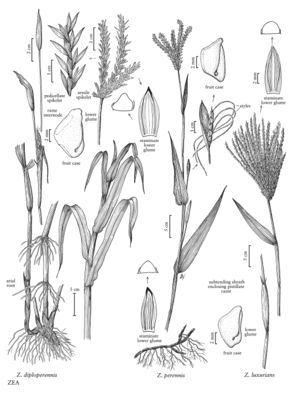Difference between revisions of "Zea luxurians"
FNA>Volume Importer |
imported>Volume Importer |
||
| (2 intermediate revisions by the same user not shown) | |||
| Line 37: | Line 37: | ||
|publication year= | |publication year= | ||
|special status= | |special status= | ||
| − | |source xml=https:// | + | |source xml=https://bitbucket.org/aafc-mbb/fna-data-curation/src/200273ad09963decb8fc72550212de541d86569d/coarse_grained_fna_xml/V25/V25_1663.xml |
|subfamily=Poaceae subfam. Panicoideae | |subfamily=Poaceae subfam. Panicoideae | ||
|tribe=Poaceae tribe Andropogoneae | |tribe=Poaceae tribe Andropogoneae | ||
Latest revision as of 17:58, 11 May 2021
Plants annual. Culms 1-3(4) m tall, 1-4 cm thick, unbranched in dense stands, abundantly branched in open areas. Blades 20-80 cm long, 3-8 cm wide, glabrous. Pistillate inflorescences 1-many per node, usually in dense, sheathed, axillary clusters; peduncles usually (0)1-8 cm, slender and not exceeding the leaf sheaths, occasionally 1(2) peduncles as long as 23 cm and exceeding the leaf sheaths; pistillate rames distichous, 6-9 cm, subtended by a sheath, with 5-9 solitary spikelets; fruitcases trapezoidal in side view, 7-11.5 mm on the long side, 3.7-6.5 mm on the short side, 3-5 mm in diameter. Caryopses concealed. Terminal staminate panicles 12-24 cm, with (4)10-28 stiffly ascending branches; branches 7-16(21) cm, internodes 3-6 mm; pedicels 3-5 mm; spikelets 4.6-12 mm, densely imbricate; lower glumes flat dorsally, stiff, not translucent, margins tightly enclosing the upper glumes, (9) 12-20(28)-veined, the 2 sublateral veins prominent, keeled, ciliate, narrowly winged distally. 2n = 20.
Discussion
Zea luxurians is endemic to Central America, growing from Guatemala to Honduras, at elevations of 600-1200 m, and may extend into Oaxaca, Mexico. It was frequently grown for forage about a century ago, and is still sometimes grown for this purpose in the southern United States. It hardly ever tillers in the wild, but forms as many as 50 tillers in favorable agricultural settings and longer day lengths than in its native range. Although it can hybridize with Z. mays subsp. mays, Z. luxurians rarely does so in the wild.
Selected References
None.
